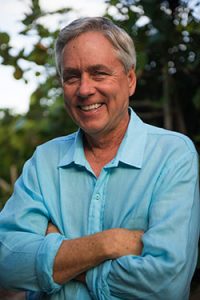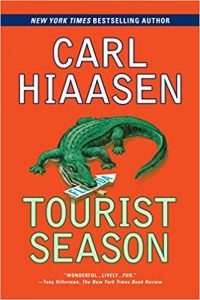Carl Hiaasen
Columnist and Author
B.S. Journalism 1974, Hall of Fame 1992
 Carl Hiaasen might be the closest thing to a larger-than-life literary figure the state of Florida has ever produced. His name is synonymous with the state and that’s because Florida is his muse. It fuels award-winning columns and novels, including nine national best sellers and a major motion picture adaptation for his novel Striptease, and a seemingly undying hunger to continue to tell stories both fictional and true about his beloved state, even into the fourth decade of his career.
Carl Hiaasen might be the closest thing to a larger-than-life literary figure the state of Florida has ever produced. His name is synonymous with the state and that’s because Florida is his muse. It fuels award-winning columns and novels, including nine national best sellers and a major motion picture adaptation for his novel Striptease, and a seemingly undying hunger to continue to tell stories both fictional and true about his beloved state, even into the fourth decade of his career.
Humor is often Hiaasen’s calling card. Since becoming a columnist for the Miami Herald in 1985, he claims he’s pissed off just about everybody in South Florida at one time or another, including his bosses. He also regards his novel Double Whammy as “the first (and possibly only) novel ever written about sex, murder, and corruption on the professional bass fishing tour.”
 Hiaasen always seemed to find ways to weave conservation into his work, sometimes to absurdist degrees. His first novel, Tourist Season, is a tale of environmental terrorists and zealots so hell bent on keeping Florida’s nature from harm that they’ll stop at nothing to keep tourists and newcomers from visiting or settling there. Other environmental themes in his novels include the aftermath of Hurricane Andrew, the restoration of the Everglades, the sugarcane industry and migrant workers, eco-tours, the encroachment of the hospitality industry on native land, and more. He’s never been afraid to satirize and take head-on the powers that be that he’s viewed as a threat to Florida and its natural balance.
Hiaasen always seemed to find ways to weave conservation into his work, sometimes to absurdist degrees. His first novel, Tourist Season, is a tale of environmental terrorists and zealots so hell bent on keeping Florida’s nature from harm that they’ll stop at nothing to keep tourists and newcomers from visiting or settling there. Other environmental themes in his novels include the aftermath of Hurricane Andrew, the restoration of the Everglades, the sugarcane industry and migrant workers, eco-tours, the encroachment of the hospitality industry on native land, and more. He’s never been afraid to satirize and take head-on the powers that be that he’s viewed as a threat to Florida and its natural balance.
“I won’t be making any friends in the corporate suites,” Hiaasen said in an interview with CNN.
Part of Hiaasen’s appeal has been his defense of Florida, his defense of his own style, and his ability to create life-like fiction, which he says comes from his years as a crime and investigative reporter.
One of his more memorable quotes: “To me the newspaper business was a way to learn about life and how things worked in the real world and how people spoke. You learn all the skills – you learn to listen, you learn to take notes – everything you use later as a novelist was valuable training in the newspaper world.”
